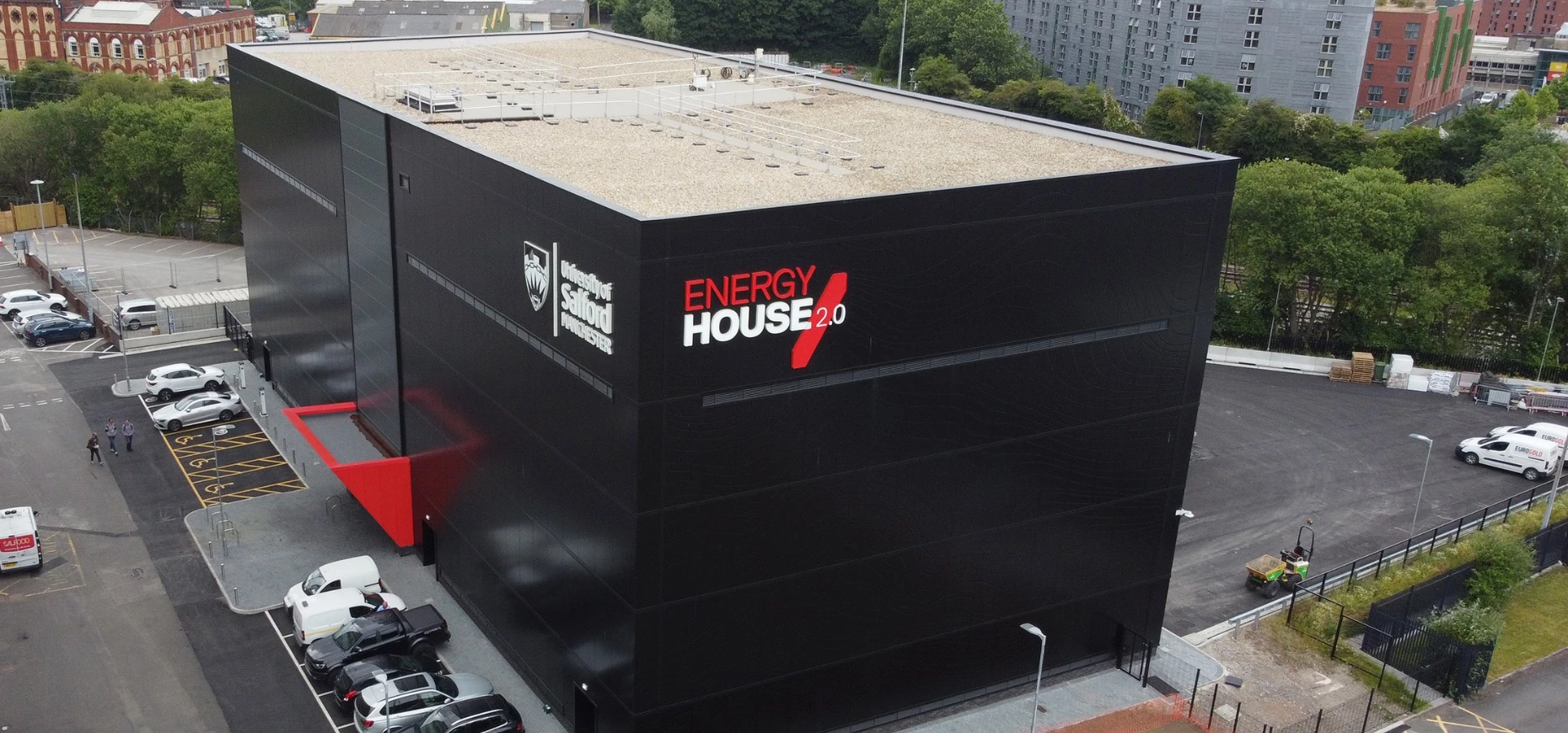
World-first £16m research facility to propel housing industry towards net zero
A “unique” facility designed to help create the energy efficient homes of the future has been unveiled at the University of Salford.
Energy House 2.0 will research and test, in tightly controlled conditions, new ways of powering, heating and insulating homes, making them more energy efficient and helping to meet new standards which require a significant reduction in carbon emissions for new build homes from 2025.
In collaboration with national housebuilders Bellway Homes and Barratt Developments, and construction solutions manufacturer Saint-Gobain, two detached houses have been built inside the climate-controlled chamber of Energy House 2.0 at the university’s Frederick Road Campus in Salford.
The homes feature a range of new technologies, each of which could contribute to lowering the amount of carbon produced when a home is built, and the carbon footprint of the people who live in the home.
Bellway’s house, named The Future Home, will test the UK’s first roof-mounted air source heat pump, along with underfloor, infrared and ambient heating, mechanical ventilation, double versus triple glazing, enhanced insulation, and a prototype shower which recovers heat from waste-water.
This £16m project, part-funded by the European Regional Development Fund, creates a world-first opportunity for innovators to undertake research and quickly understand the performance of their buildings, systems, and products, in a way that is “not possible in any other facility”.
Professor Will Swan, director of Energy House Labs at the University of Salford, commented: “The growing challenges of climate change and the cost-of-living crisis mean we need to consider how we build and operate our homes.
“Energy House 2.0 mission is to work with industry and policy makers to provide evidence for what works in meeting these challenges.
“Energy efficient, high performing homes can change people’s lives. The importance of this agenda is one of the main reasons behind the University of Salford’s major investment in Energy House 2.0, which is a critical piece of research infrastructure that can help us find solutions to these problems.
“Our cutting-edge research is already having a real world impact and as the cost of gas and electricity keeps going up and up this work is even more important to create a sustainable and economically viable future for this country and the world.”
Jamie Bursnell, group innovation and technical manager for Bellway, added: “This is pioneering research and we were treading on new ground here. A lot of praise is due to the team at Bellway Manchester who rose to the challenge of building a fully-working three-bedroom house inside an enclosed chamber.”
By Matthew Neville – Senior Correspondent, Bdaily
- Add me on LinkedIn and Twitter to keep up to date
- And follow Bdaily on Facebook, Twitter and LinkedIn
- Submit press releases to editor@bdaily.co.uk for consideration.
Looking to promote your product/service to SME businesses in your region? Find out how Bdaily can help →




 test article 123456789
test article 123456789
 hmcmh89cg45mh98-cg45hm89-
hmcmh89cg45mh98-cg45hm89-
 test456456456456456456
test456456456456456456
 test123123123123123123
test123123123123123123
 test xxxdiosphfjpodskhfiuodsh
test xxxdiosphfjpodskhfiuodsh
 Savour the flavour: North Tyneside Restaurant Week returns for 2024
Savour the flavour: North Tyneside Restaurant Week returns for 2024
 Six steps to finding the right buyer for your business
Six steps to finding the right buyer for your business
 Stephen signs off on a special night
Stephen signs off on a special night
 Life’s a Peachaus: Gillian Ridley Whittle
Life’s a Peachaus: Gillian Ridley Whittle
 Making a splash: Phil Groom
Making a splash: Phil Groom
 Making workplace wellbeing a priority
Making workplace wellbeing a priority
 A record of delivery, a promise of more: Ben Houchen
A record of delivery, a promise of more: Ben Houchen